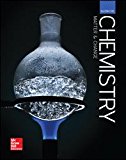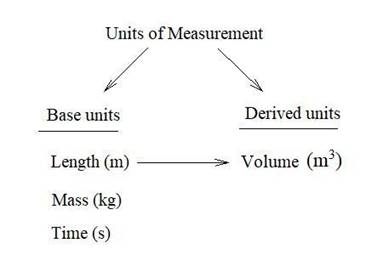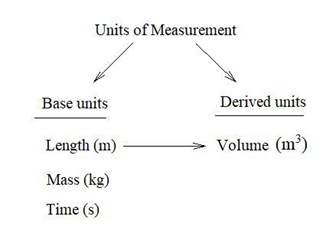
Interpretation:
A concept mass that shows the relationship among volume, derived unit, mass, base unit, time and length is to be designed.
Concept introduction:
Concept map or conceptual diagram is used to represent the relationship between different concepts. The idea and information is represented by boxes and circles which are connected with labeled arrows in downward branching hierarchical structure.
Answer to Problem 10SSC
A concept mass that shows the relationship among volume, derived unit, mass, base unit, time and length is given below:

Explanation of Solution
The given concept map of the relationship among volume, derived unit, mass, base unit, time and length shows that there are two units of measurement, base units and derived units.
Base units are length, which is measured in meter (m), mass, which is measured in kilogram (kg) and time which is measured in seconds (s). Now, derived units are the units obtained from the combination of the base units, and from the given concepts volume is a derived unit from length and is measured in cubic meter or

The concept map for the relationshipamong volume, derived unit, mass, base unit, time and length is given above.
Chapter 2 Solutions
Glencoe Chemistry: Matter and Change, Student Edition
Additional Science Textbook Solutions
Chemistry: Structure and Properties
Chemistry: A Molecular Approach (4th Edition)
Organic Chemistry (8th Edition)
Chemistry: Structure and Properties (2nd Edition)
Chemistry: A Molecular Approach
Chemistry: The Central Science (13th Edition)
 ChemistryChemistryISBN:9781305957404Author:Steven S. Zumdahl, Susan A. Zumdahl, Donald J. DeCostePublisher:Cengage Learning
ChemistryChemistryISBN:9781305957404Author:Steven S. Zumdahl, Susan A. Zumdahl, Donald J. DeCostePublisher:Cengage Learning ChemistryChemistryISBN:9781259911156Author:Raymond Chang Dr., Jason Overby ProfessorPublisher:McGraw-Hill Education
ChemistryChemistryISBN:9781259911156Author:Raymond Chang Dr., Jason Overby ProfessorPublisher:McGraw-Hill Education Principles of Instrumental AnalysisChemistryISBN:9781305577213Author:Douglas A. Skoog, F. James Holler, Stanley R. CrouchPublisher:Cengage Learning
Principles of Instrumental AnalysisChemistryISBN:9781305577213Author:Douglas A. Skoog, F. James Holler, Stanley R. CrouchPublisher:Cengage Learning Organic ChemistryChemistryISBN:9780078021558Author:Janice Gorzynski Smith Dr.Publisher:McGraw-Hill Education
Organic ChemistryChemistryISBN:9780078021558Author:Janice Gorzynski Smith Dr.Publisher:McGraw-Hill Education Chemistry: Principles and ReactionsChemistryISBN:9781305079373Author:William L. Masterton, Cecile N. HurleyPublisher:Cengage Learning
Chemistry: Principles and ReactionsChemistryISBN:9781305079373Author:William L. Masterton, Cecile N. HurleyPublisher:Cengage Learning Elementary Principles of Chemical Processes, Bind...ChemistryISBN:9781118431221Author:Richard M. Felder, Ronald W. Rousseau, Lisa G. BullardPublisher:WILEY
Elementary Principles of Chemical Processes, Bind...ChemistryISBN:9781118431221Author:Richard M. Felder, Ronald W. Rousseau, Lisa G. BullardPublisher:WILEY





